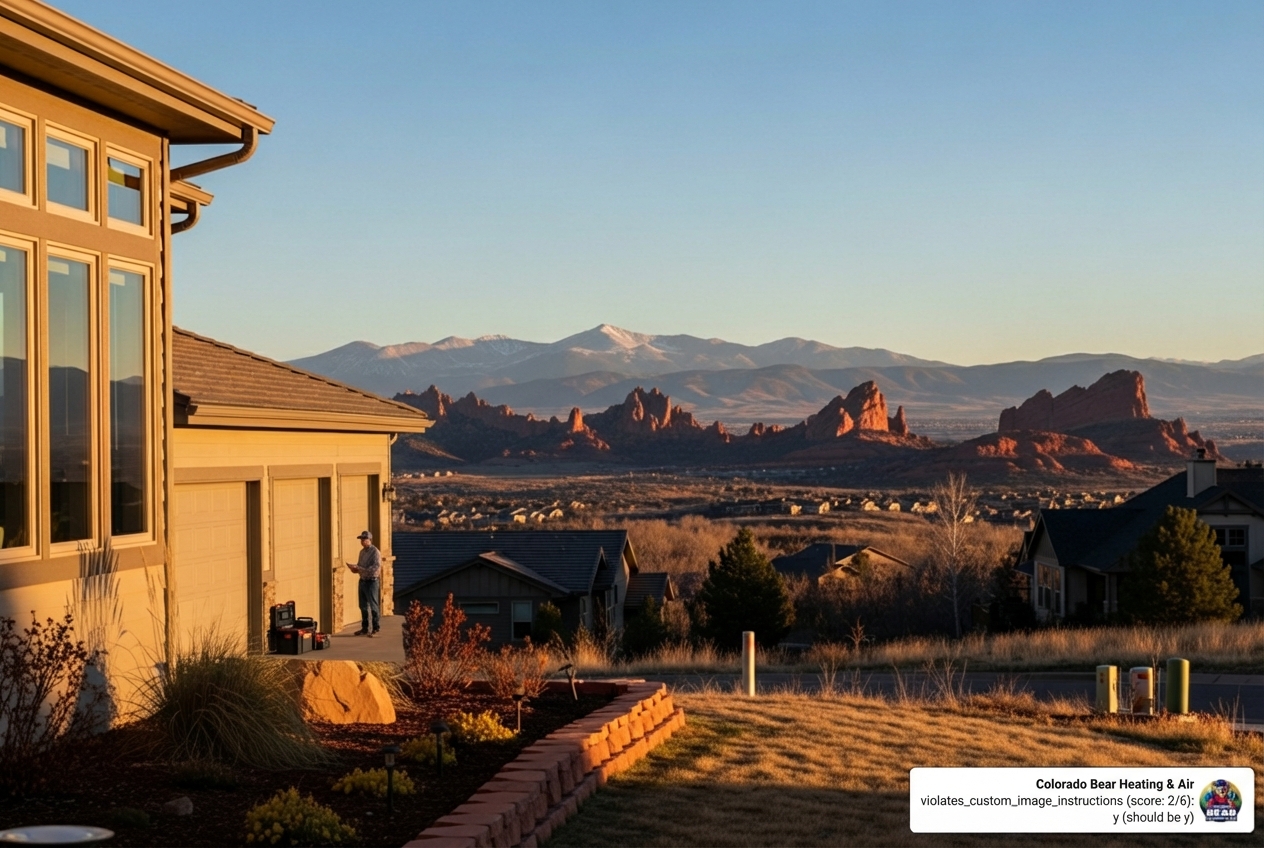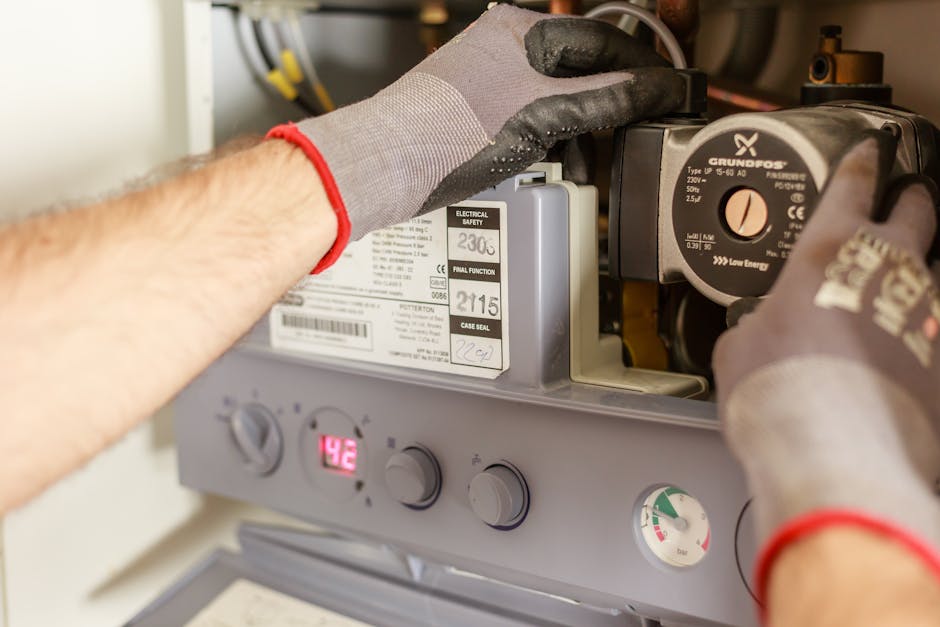
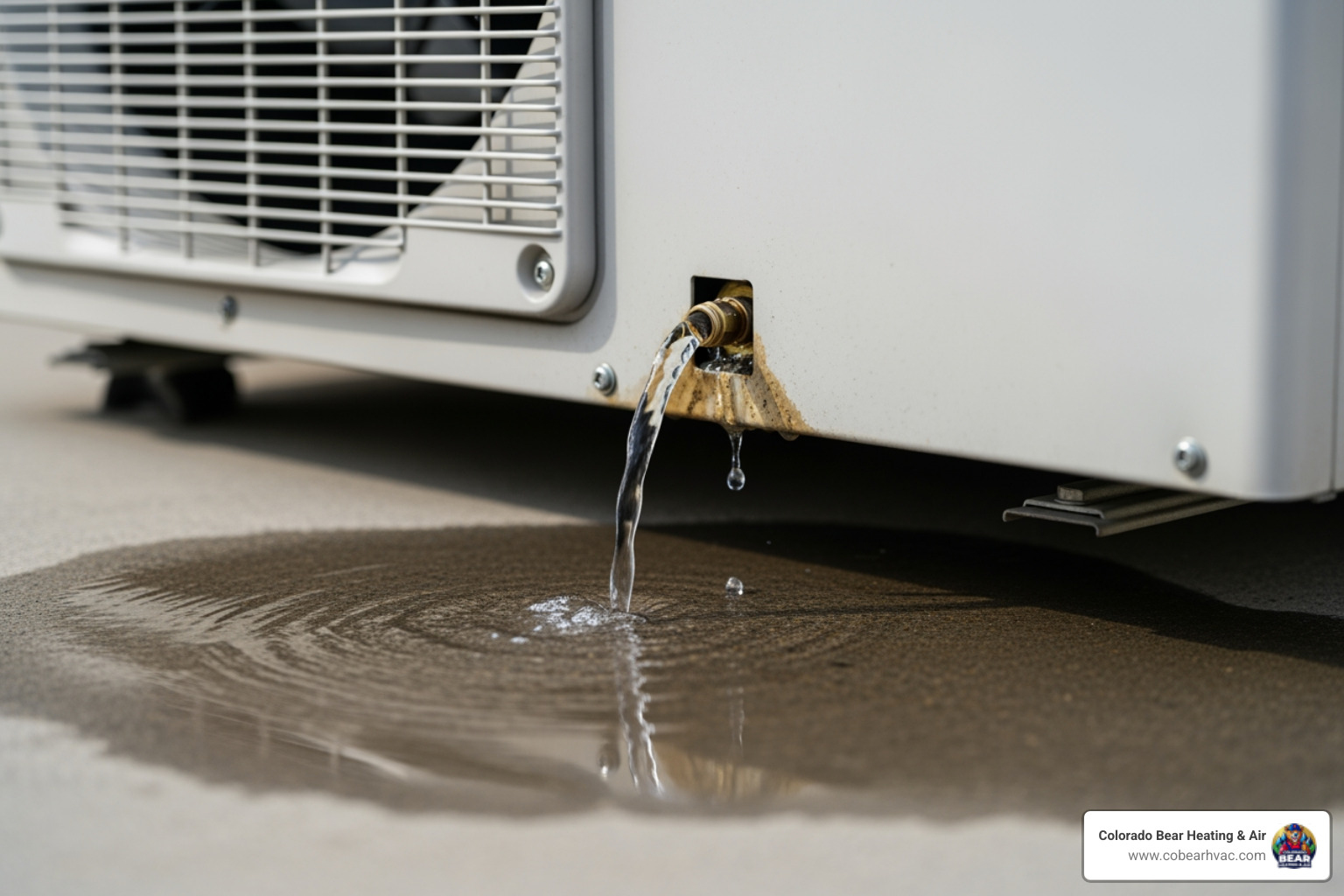

Why a Heat Pump Leaking Water Demands Your Attention
Finding heat pump leaking water in castle pines, co is more than just a puddle problem—it's a signal that your system needs immediate attention. Water where it shouldn't be can damage your home, encourage mold growth, and point to issues that could shut down your entire system if ignored. Understanding what's normal and what's not is the first step to protecting your home.
Quick Action Guide for Heat Pump Water Leaks:
- If water is pooling indoors near your air handler: Turn off the system at the breaker and check for a clogged drain line or overflowing drain pan.
- If you see ice on indoor coils: Restricted airflow (dirty filter) or low refrigerant may be the cause; let ice melt naturally with the system off.
- If water drips from ceiling vents or registers: This is never normal; call a professional immediately.
- If you notice clear water outside near the outdoor unit in winter: This is likely normal defrost meltwater, not a problem.
- If the leak is oily or hissing sounds are present: Stop the system immediately; this could be a refrigerant leak.
For comprehensive heat pump services and expert diagnostics, explore our Heat Pump Services in Castle Rock, CO, or schedule your heat pump repair now to prevent further damage.
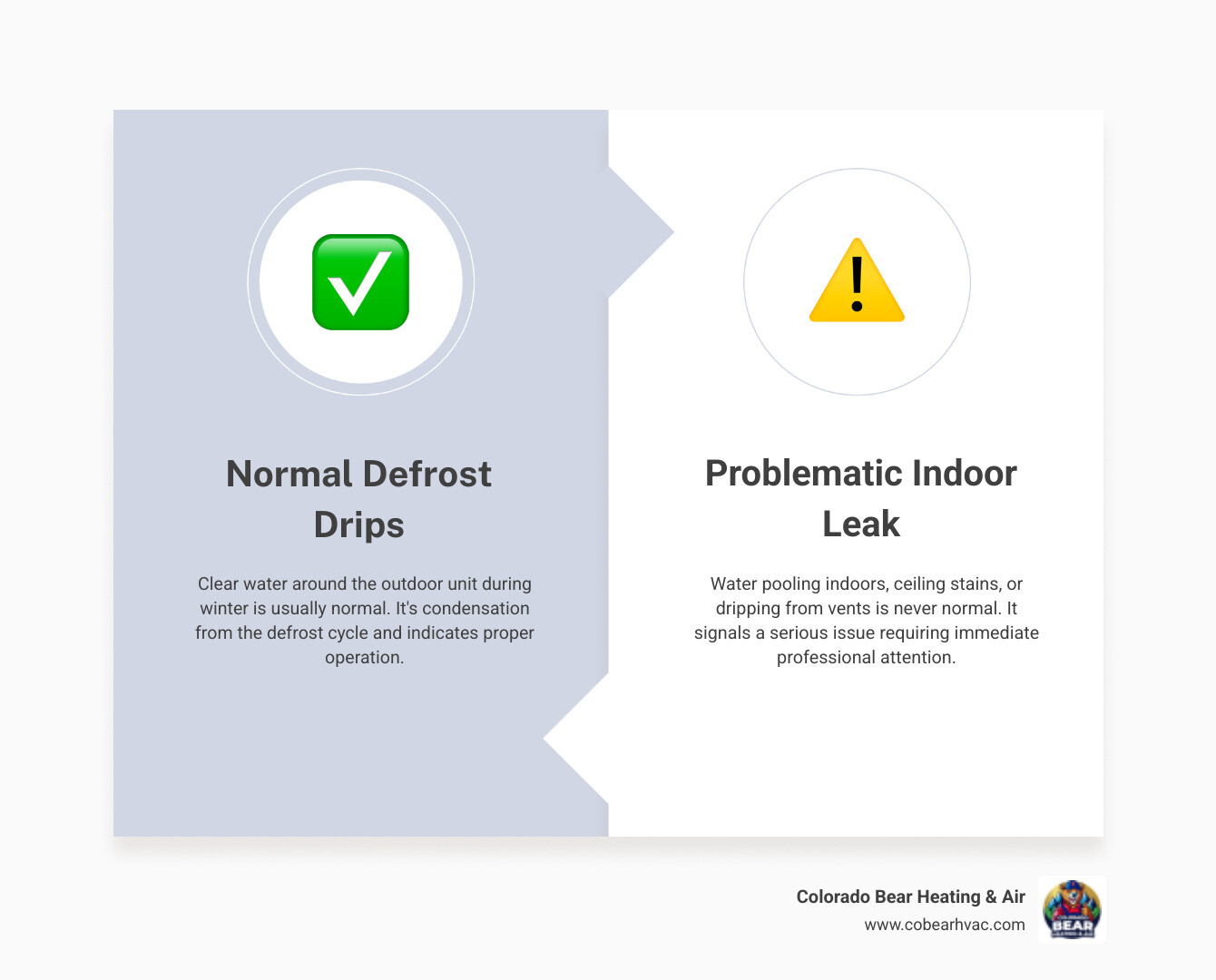
Is It a Leak or Normal Condensation?
When you spot water near your heat pump, it's important to know that not all moisture is a sign of a problem. Heat pumps are designed to produce condensation.
Understanding Normal Heat Pump Operation
- Summer Cooling Mode: Your heat pump acts like an air conditioner, pulling humidity from your home's air. This water collects in a drain pan and flows outside through a condensate line. A steady trickle from this line on a hot day is normal.
- Winter Heating Mode: In colder weather, your heat pump's outdoor coil can frost over. To maintain efficiency, the system runs a "defrost cycle," melting the ice. Seeing water or a small puddle around your outdoor unit in winter is often just a sign that your heat pump is working correctly.
The problem arises when that water doesn't drain properly and ends up inside your home.
Signs of a Problematic Water Leak
While some moisture is normal, these signs demand immediate attention:
- Water Around the Indoor Unit: Any pooling water on the floor around your indoor air handler is a red flag.
- Dripping from Vents: Water dripping from ceiling vents is never normal and suggests an overflow.
- Damp Drywall or Flooring: Visible damp spots or discoloration on walls, ceilings, or floors near your unit indicate a persistent leak.
- Musty Odors: A mildewy smell near vents is a strong indicator of water accumulation and potential mold growth.
- System Short-Cycling: If your heat pump turns on and off frequently, it might be a safety switch tripping because of an overflowing drain pan.
Water Leak vs. Refrigerant Leak
It's crucial to distinguish between a water leak and a refrigerant leak, as they have different causes and dangers.
| Feature | Water Leaks | Refrigerant Leaks |
|---|---|---|
| Appearance | Clear, odorless water. | Oily or greasy substance. |
| Sound | Dripping or running water sounds. | A hissing or bubbling sound near refrigerant lines. |
| System Performance | May not immediately affect cooling/heating. | Significant drop in cooling or heating efficiency. |
| Health/Safety | Can cause water damage and mold growth. | Refrigerant is a chemical that requires professional handling. |
Common Causes of a Heat Pump Water Leak
If you've determined you have a problematic leak, it's likely due to one of these common issues, which are often influenced by the Castle Pines climate.
- Clogged Condensate Drain Line: This is the most frequent cause. Over time, algae, mold, and debris can build up in the drain line, causing water to back up and overflow the drain pan.
- Frozen Evaporator Coils: Restricted airflow from a dirty air filter or blocked vents can cause the indoor evaporator coil to get too cold and freeze. When the ice melts, it can overwhelm the drain pan and cause a leak. Low refrigerant can also cause freezing.
- Cracked or Damaged Drain Pan: The pan that collects condensation can crack or rust over time, allowing water to leak out directly.
- Condensate Pump Failure: If your system uses a pump to remove water (common in basements), a malfunction or power failure will cause water to back up.
- Improper Installation: A unit that isn't level or has an incorrectly sloped drain line will not drain properly from the start.
What Are the Potential Damages Caused by a Heat Pump Water Leak in a Castle Pines Home?
A seemingly small water leak from your heat pump can quickly escalate, leading to significant and costly problems. Ignoring a heat pump leaking water in castle pines, co can threaten your home, health, and finances. Key risks include:
- Structural Damage: Water can seep into drywall, wood framing, and subflooring, causing rot, warping, and even compromising the structural integrity of your home.
- Mold and Mildew Growth: The constant moisture creates a perfect environment for mold, which can grow in walls, floors, and ductwork. Mold spores can trigger allergies, asthma, and other respiratory issues.
- Electrical Hazards: Water coming into contact with your system's wiring can create a risk of short circuits, electrical shock, or even fire.
- Damage to Belongings: Water can ruin carpets, furniture, electronics, and personal items stored near the leak.
- HVAC System Failure: Persistent moisture can corrode a heat pump's internal components, leading to expensive repairs or a complete system breakdown.
Promptly addressing a leak is essential to protect your home, health, and investment. For expert help, our team at Colorado Bear Heating & Air is ready to assist.
What DIY Steps Can Castle Pines Homeowners Take to Address a Minor Heat Pump Water Leak?
If you've found your heat pump leaking water in castle pines, co, some basic troubleshooting can often solve the problem. Before you begin, turn off the power to your HVAC system at the circuit breaker for safety.
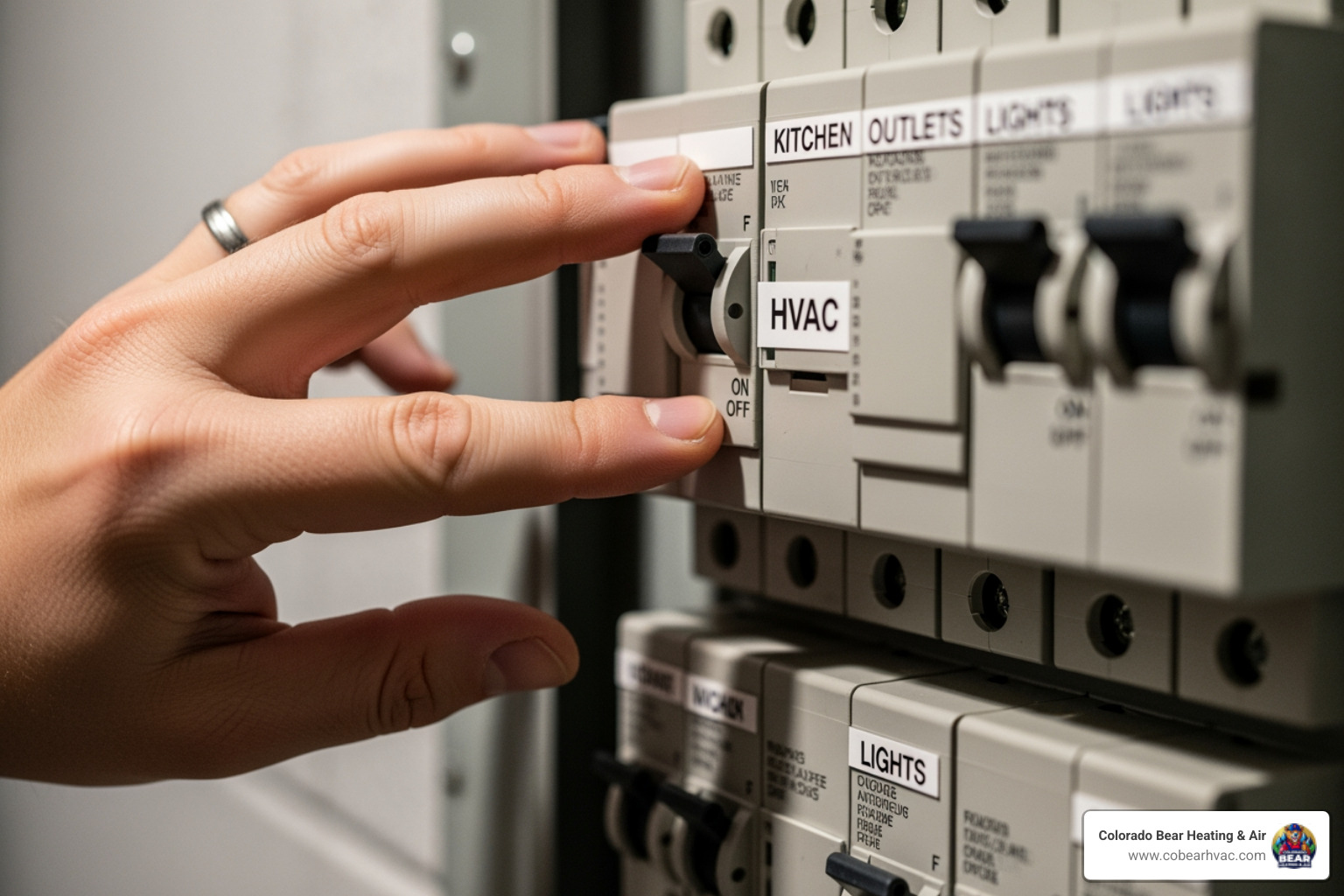
- Check the Air Filter: A clogged filter is a primary cause of frozen coils and water leaks. If your filter is dirty, replace it.
- Inspect the Drain Pan: Look at the pan under the indoor unit. If it's full of water, the drain line is likely clogged. Also, check the pan for any visible cracks.
- Clear the Condensate Line: Use a wet/dry vacuum on the exterior end of the drain line to suck out any blockage. You can also try pouring a cup of distilled white vinegar down the line's access point near the indoor unit to dissolve buildup, followed by a flush of water.
- Thaw Frozen Coils: If you see ice on the indoor coil, keep the system off and allow it to melt naturally. Do not try to chip it away.
If the leak continues after these steps, it's time to call for professional help. For comprehensive service, explore our Heat Pump Services in Castle Rock, CO, or schedule your heat pump repair now.
When Should a Castle Pines Homeowner Call a Professional for Heat Pump Water Leak Repair?
While DIY fixes can handle minor issues, some problems require a professional. Call for help with your heat pump leaking water in castle pines, co if you notice any of the following:
- The Leak Persists: The leak continues after you've cleaned the filter and drain line.
- Signs of a Refrigerant Leak: You see an oily substance, hear a hissing sound, or your system isn't cooling/heating properly. Refrigerant is hazardous and requires professional handling.
- Recurring Ice Buildup: If the indoor coil repeatedly freezes, it points to a deeper issue like low refrigerant or a faulty part.
- Electrical Problems: If the breaker trips or you smell something burning, turn off the power immediately and call an expert.
- Visible Damage or Loud Noises: A cracked drain pan, or any grinding or banging sounds, signals a need for professional repair.
- Water Dripping from Ceilings or Vents: This is always a sign of a serious problem that needs immediate expert attention.
Attempting complex repairs without the right tools can cause more damage or void your warranty. Our experienced technicians at Colorado Bear Heating & Air can diagnose and fix the problem safely.
Preventing Future Leaks: The Role of Maintenance and Climate
The best way to avoid a heat pump leaking water in castle pines, co is through proactive maintenance. Regular check-ups can prevent most common causes of leaks, improve efficiency, and extend the life of your system.
The Importance of Regular Professional Maintenance
- Biannual Tune-Ups: A professional inspection in the spring and fall is the most effective way to catch problems early.
- Cleaning Coils: Technicians will clean evaporator and condenser coils to ensure proper heat transfer and prevent freezing.
- Checking Refrigerant Levels: Correct refrigerant levels are crucial. A pro can check for and repair any leaks.
- Inspecting and Clearing Drain Lines: A technician will flush the condensate drain line to remove any buildup that could cause a blockage and overflow.
- Testing Electrical Components: Checking all electrical connections and safety switches prevents water-related electrical hazards.
How Castle Pines' Climate Affects Your Heat Pump
Our local environment affects your heat pump's operation:
- High Elevation & Dry Air: Thinner, drier air means your system may work harder and accumulate dust more quickly. This makes clean filters and coils especially important.
- Freeze-Thaw Cycles: Colorado's fluctuating winter temperatures put stress on the defrost system. Regular maintenance ensures it functions correctly, preventing excessive ice buildup on the outdoor unit.
Frequently Asked Questions about Heat Pump Leaks
Here are answers to common questions about a heat pump leaking water in castle pines, co.
How much water is normal for a heat pump to produce?
A lot, actually. In summer, it's normal for the indoor unit to produce over a gallon of condensation per hour, which should drain away outside. In winter, the outdoor unit will drip water during its defrost cycle. This is all part of normal operation. It only becomes a problem when the water appears inside your home.
Can I run my heat pump if it's leaking a little water?
No. You should turn the system off immediately if it's leaking indoors. Continuing to run it can lead to significant water damage, mold growth, and electrical hazards. The leak is a symptom of a problem that will only get worse, leading to more expensive repairs.
Could the leak be from something other than my heat pump?
Yes. Water in your utility area could also come from a leaking water heater, plumbing pipe, or whole-home humidifier. If your air handler is in the attic, a roof leak is another possibility. Try to trace the water to its source. If you're unsure, a professional can quickly identify the problem.
Your Local Experts for Heat Pump Repair in Castle Pines
When you find a heat pump leaking water in castle pines, co, you need a fast, reliable solution. At Colorado Bear Heating & Air, we have over 20 years of experience helping homeowners in Castle Pines and the surrounding Denver Metro Area resolve HVAC issues quickly and effectively.
We understand the unique challenges our local climate poses for heat pump systems. Our technicians are equipped to diagnose the root cause of any leak, from a clogged drain to more complex component failures, and provide a lasting repair. We prioritize transparent, honest service to protect your home from water damage, mold, and further system issues.
Don't let a water leak compromise your comfort or safety. The sooner you address it, the better. Our team is ready to restore your peace of mind and ensure your heat pump runs efficiently year-round.
For expert heat pump repair and comprehensive service, Schedule Your Heat Pump Service in Castle Rock, CO today.
Latest blogs

Apply now for flexible payment options
Get a decision in seconds with no impact to your credit score.



Testimonials
Service Areas
If you’re in Colorado Springs, The Mountains, or nearby areas, call us to confirm availability for installations.
.avif)















.avif)
.avif)
.avif)




